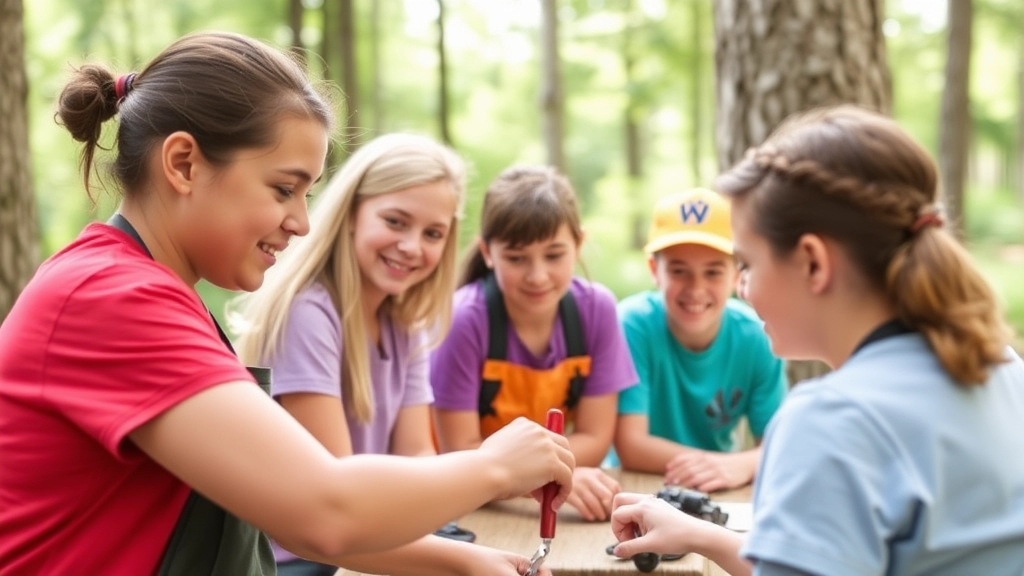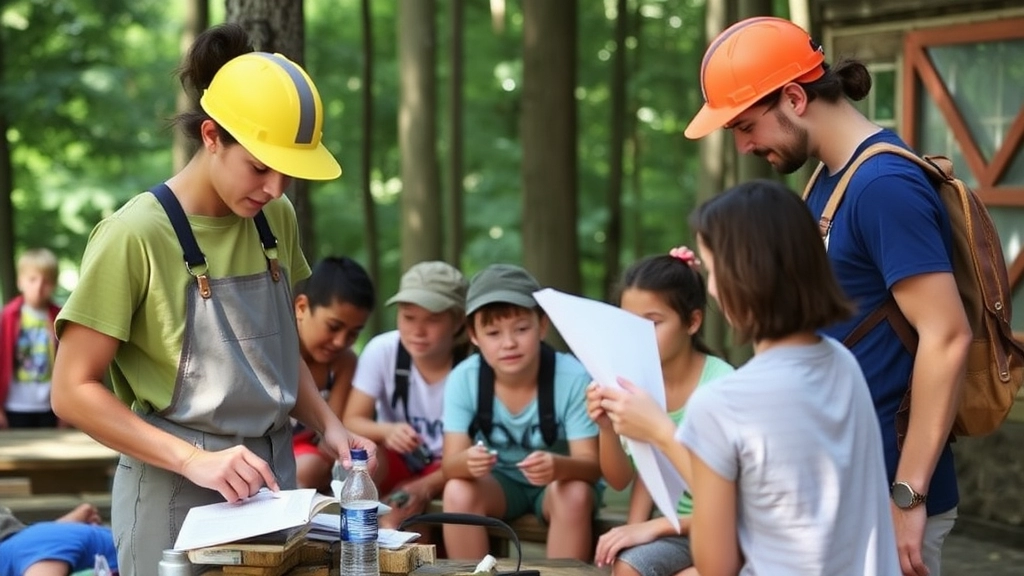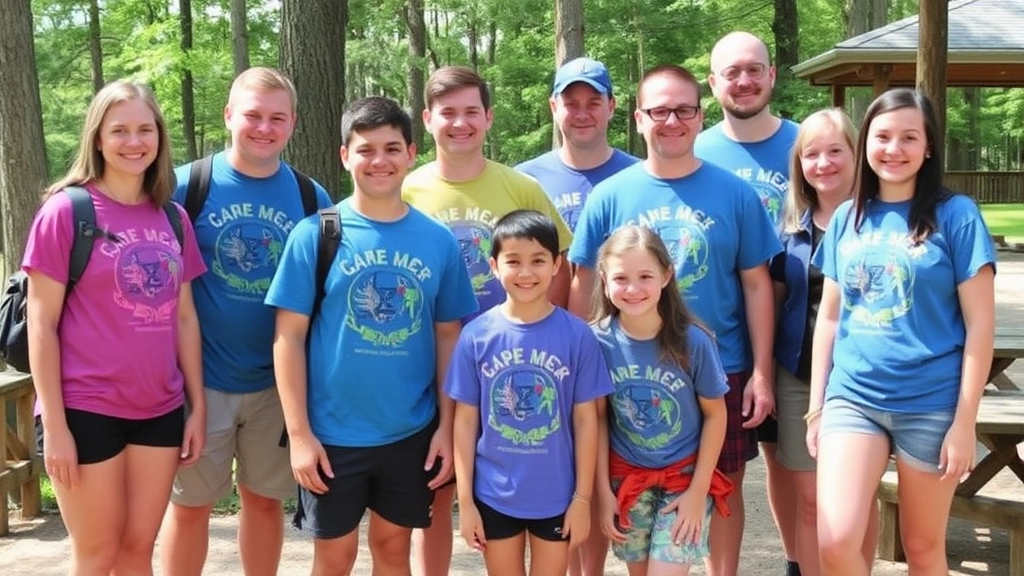Ever wondered what it takes to be part of the dynamic world of summer camps?
This article dives deep into the multifaceted roles and responsibilities of camp summer staff, exploring the essential skills and qualifications needed to thrive in this environment. From the benefits of working outdoors to the lifelong connections and career growth opportunities, we cover it all to give you a comprehensive guide on becoming an exceptional summer camp staff member.
Discover how to apply for summer camp jobs
The training programs available, and what daily life looks like for camp staff. We also delve into the physical and mental health benefits of working outdoors and the educational opportunities for college students. Hear firsthand testimonials from former camp staff members and learn how these experiences can shape your future.
If you’re ready to embark on a rewarding journey
This article is your ultimate resource.
Roles and Responsibilities of Summer Camp Staff
Ever wondered what it’s really like working at a summer camp?
You’re not alone. Many people are curious about what goes on behind the scenes. So, let’s dive in and break it down.
What Do Summer Camp Staff Actually Do?
The keyword here is variety. Summer camp staff play a ton of different roles, and it’s not just about keeping an eye on kids. Here’s a quick rundown:
Activity Leaders
- Plan and lead activities: Think arts and crafts, sports, and outdoor adventures.
- Ensure safety: Always a top priority, making sure everyone’s having fun without getting hurt.
Counsellors
- Mentorship: Guide campers through their day, offering support and advice.
- Conflict resolution: Help resolve any disagreements or issues that pop up.
Support Staff
- Behind-the-scenes heroes: Handle logistics, meals, and maintenance.
- Smooth operations: Ensure everything runs like a well-oiled machine.
Specialist Instructors
- Expertise sharing: Teach specific skills like archery, swimming, or music.
- Skill development: Help campers grow and learn new talents.
Why Are These Roles Important?
Each role is crucial for creating a memorable and safe camp experience. Without dedicated staff, camps wouldn’t be the enriching environments they are known for.
Real Talk: What’s It Like Day-to-Day?
Imagine waking up early to the sound of nature, grabbing a quick breakfast, and then diving into a day packed with activities. It’s rewarding but can be exhausting, too. Here’s what you might face:
- Early mornings: Start your day with energy and a smile.
- Long hours: Be prepared for a full schedule, from sunrise to sunset.
- Teamwork: Collaboration is key. You’re part of a team that supports each other.
Stories From the Trenches
I remember one summer when a group of campers was struggling with homesickness. As a counsellor, I organised a fun evening of storytelling and s’mores. By the end of the night, everyone was laughing and bonding. Moments like these make all the hard work worth it.
If you’re interested in finding the right camp for your child, check out our guide on the ultimate boys and girls summer camps. For those looking for specialized experiences, our list of top acting summer camps for aspiring actors is a great resource.
Skills and Qualifications Required for Camp Staff

Ever wondered if you have what it takes to be an awesome summer camp staff member?
Let’s break it down.
What skills do you need?
First off, you’ve got to be a jack-of-all-trades.
Here are some key skills:
- Communication: You’ll be chatting with kids, parents, and other staff all day. Clear and friendly communication is a must.
- Leadership: Kids look up to you. You need to guide them, keep them safe, and make sure they’re having a blast.
- Problem-Solving: Things go wrong. It’s camp life. You need to think on your feet and fix issues quickly.
- Patience: Kids can be a handful. Keep your cool, always.
- Teamwork: You’re part of a crew. Be ready to help out and pitch in.
Qualifications?
Now, what about qualifications?
- First Aid/CPR Certification: Safety first. Many camps require this.
- Experience with Kids: Babysitting, tutoring, or coaching? All great.
- Special Skills: Can you swim, play guitar, or lead a hike? Camps love special talents.
- Background Check: Camps need to know you’re trustworthy.
Got those? Great.
But don’t worry if you’re missing a few. Many camps offer training to get you up to speed.
Why does this matter?
Having the right skills and qualifications isn’t just about getting the job. It’s about making sure you can handle the ups and downs of camp life.
You want to be the person kids remember as their favourite camp leader.
And trust me, it’s worth it.
Ready to dive in?
Check out the Camp Staff Training Programs section to see how you can prep for the role.
Benefits of Working at a Summer Camp
Ever wondered if working at a summer camp could be more than just a way to pass the time and earn a bit of cash? Let’s break it down.
Why Should You Consider Working at a Summer Camp?
You might be asking yourself: “Is working at a summer camp really worth it?” Well, let me tell you, it’s not just about the paycheck. Here’s the lowdown on why you should seriously think about it:
- Skill Development: You’ll pick up a ton of new skills. From leadership and communication to problem-solving and teamwork, working at a camp is like a crash course in personal development. These are skills that look great on any CV.
- Networking: You’ll meet people from all walks of lifeâcampers, fellow staff, and even parents. These connections can open doors you never even knew existed.
- Outdoor Fun: Say goodbye to the 9-to-5 grind and hello to the great outdoors. You’ll spend your days engaging in activities that are both fun and physically rewarding.
- Free Room and Board: Many camps offer free accommodation and meals. That’s more money in your pocket and less stress about living expenses.
- Travel Opportunities: Some camps are located in amazing places. Imagine spending your summer in the mountains, by a lake, or even abroad!
Real Stories, Real Benefits
Let me share a quick story. My buddy Tom worked at a camp last summer. He went in thinking it was just a job to fill his summer, but he came out with a newfound confidence and a network of lifelong friends. He even landed a job offer from one of the parents who was impressed by his leadership skills.
What’s in it for You?
Here’s a quick list of the perks you can expect:
- Personal Growth: You’ll gain a better understanding of yourself and your capabilities.
- Professional Experience: Real-world experience that will make you stand out to future employers.
- Health Benefits: Working outdoors can do wonders for your physical and mental health.
- Lifelong Memories: The experiences you’ll have and the people you’ll meet will stay with you forever.
- Career Opportunities: Believe it or not, many camp staff find their true calling through their summer jobs.
To explore more about the various camps you could work at, check out our top summer camps in Albuquerque or discover the JCC summer camps for a fun, safe, and inclusive experience.
How to Apply for Summer Camp Jobs

Ever wondered how to land that perfect summer camp job?
Trust me, it’s simpler than you think.
Why summer camp jobs?
You get to work outdoors, make lifelong connections, and build your CV.
Sounds good, right?
Alright, let’s break it down.
Research Camps
Start by looking up different camps.
Do you want to work in a day camp or sleepaway camp?
Each has its vibe.
Day camps are usually local, so you get to go home every night.
Sleepaway camps? You live there, fully immersed in the camp life.
Check Qualifications
Each camp has its own set of requirements.
Most camps look for:
- Experience with kids: Babysitting, tutoring, or coaching counts.
- Certifications: First Aid, CPR, and sometimes lifeguard training.
- Special skills: Can you teach archery? How about arts and crafts?
Craft Your CV
Highlight your relevant experience.
Make it pop.
List out:
- Past jobs working with kids.
- Any certifications you hold.
- Skills that make you stand out.
Write a Killer Cover Letter
This is where you show your personality.
Explain why you’re passionate about working at a camp.
Share a story or two.
Maybe that time you led a group project or helped a kid learn to swim.
Apply Online
Most camps have online applications.
Head to their websites.
Fill out the forms.
Upload your CV and cover letter.
Prepare for the Interview
Got an interview?
Great!
Here’s what you do:
- Research the camp’s history and values.
- Prepare answers for common questions like, “Why do you want to work here?”
- Have questions ready for them too.
Follow Up
After the interview, send a thank-you email.
Keep it short and sweet.
Reiterate your interest in the job.
Network
Know someone who worked at a camp?
Ask them for tips.
Sometimes, a good word from a former staff member can make all the difference.
Camp Staff Training Programs
Are you worried about stepping into a summer camp role without the right skills? You’re not alone. Many of us wonder if we’re truly prepared for the challenges and excitement of working at a camp. But fear notâcamp staff training programs are here to help.
What is Camp Staff Training?
Camp staff training is your ticket to feeling confident and ready. It’s all about equipping you with the knowledge and skills you need to thrive in a camp environment. Whether you’re a seasoned pro or a newbie, these programs are designed to make sure you’re prepared for anything.
Why is Training Important?
Training isn’t just a box to tickâit’s a game-changer. Here’s why:
- Safety First: Camps are fun, but safety is key. Training ensures you know how to handle emergencies and keep everyone safe.
- Skill Development: From leadership to problem-solving, you’ll learn skills that are valuable both at camp and in life.
- Team Building: You’ll bond with your fellow staff, creating a supportive network that lasts beyond the summer.
What to Expect in Training
So, what does camp staff training actually involve? Let me break it down for you:
- Workshops and Seminars: Get ready for interactive sessions on everything from child development to outdoor activities.
- Hands-On Practice: You’ll dive into real-life scenarios, practising what to do in various situations.
- Role-Playing: This is where you get to step into different roles, understanding perspectives and honing your communication skills.
The Training Process
Here’s a quick look at how training typically unfolds:
- Orientation: Get the lowdown on camp values, policies, and expectations.
- Skills Workshops: Focus on specific areas like first aid, conflict resolution, and activity planning.
- Team Challenges: Work with your team to solve problems and build camaraderie.
- Feedback Sessions: Receive constructive feedback to help you grow and improve.
Real Talk: My Experience
When I first started, I was nervous. But the training turned everything around. I remember a session where we practised emergency drillsâit was intense but incredibly empowering. By the end of it, I felt ready to tackle anything camp life threw my way.
Key Takeaways
- Confidence Boost: Training gives you the confidence to lead and support campers effectively.
- Lifelong Skills: You’ll walk away with skills that benefit you in any career.
- Community Building: You’ll form connections that last a lifetime.
If you’re interested in learning more about the benefits of being a camp counselor, check out our detailed guide on summer camp counselor duties and responsibilities. And for those looking to find the perfect camp experience, our ultimate summer camp calendar guide is a must-read!
Work Environment and Daily Life of Summer Camp Staff

Ever wondered what a day in the life of a summer camp staff member looks like?
Let’s dive in.
Daily Routine
From the crack of dawn to the setting sun, camp life is a whirlwind.
But it’s a good kind of whirlwind.
Here’s a typical day:
- Morning: Wake up early, and get the campers ready for breakfast. Think of it as herding cats, but with more energy.
- Midday: Activities galore. Whether it’s archery, swimming, or arts and crafts, you’re in the thick of it.
- Afternoon: More activities, plus some downtime. This is where you really get to know the kids.
- Evening: Dinner, campfires, and maybe a bit of singing. It’s all about bonding and creating memories.
- Night: Lights out for campers, but you might have some staff meetings or prep for the next day.
Work Environment
You’re not stuck in a cubicle.
You’re outdoors, breathing fresh air.
You get to:
- Be surrounded by nature.
- Enjoy the sun (and sometimes the rain).
- Move around, keeping active.
Challenges
It’s not all fun and games.
There are challenges.
- Homesick kids: You’ll need to be a comforting presence.
- Long hours: Days can be long and tiring.
- Unexpected issues: Things don’t always go to plan. Flexibility is key.
Rewards
But the rewards?
They’re immense.
- Personal growth: You learn patience, leadership, and problem-solving.
- Impact: You make a real difference in kids’ lives.
- Memories: You create unforgettable experiences.
Stories from the Field
Let me share a quick story.
One summer, we had a camper who was terrified of the water.
By the end of the week, with a lot of encouragement and patience, they were swimming like a fish.
Moments like these make it all worth it.
Internships and Educational Opportunities for College Students
Ever wondered how working at a summer camp can boost your career? I get it, you’re probably thinking, “How can a summer job at a camp help me in the real world?” Well, let me break it down for you.
Real-World Experience in a Fun Setting
First off, internships at summer camps provide real-world experience. You’re not just flipping burgers or filing papers. You’re taking on responsibilities that matter. Whether you’re leading activities, managing groups, or planning events, you’re gaining skills that employers love to see.
- Leadership Skills: You’ll be in charge of groups, making decisions, and solving problems on the fly.
- Communication: You’ll be working with kids, parents, and other staff members, honing your ability to communicate effectively.
- Time Management: With a packed schedule, you’ll learn to juggle multiple tasks and priorities.
Educational Opportunities Galore
Now, let’s talk about the educational opportunities. Many camps partner with universities to offer college credit for your work. Imagine getting credits for having fun and making a difference. Sounds like a win-win, right?
- Course Credits: Some camps offer internships that count towards your degree.
- Professional Development: Workshops and training sessions are often part of the deal, giving you a leg up in your career.
- Networking: You’ll meet people from all walks of life, opening doors to future job opportunities.
Stories from the Trenches
Let me share a quick story. Last summer, I met Sarah, a college student majoring in Education. She took an internship at a summer camp, thinking it would just be a fun way to spend her summer. Fast forward three months, she not only earned credits but also landed a job offer from a local school district. The hands-on experience she gained was invaluable, and it showed in her job interviews.
How to Make the Most of It
So, how can you make the most out of these opportunities? Here are a few tips:
- Be Proactive: Don’t wait for opportunities to come to you. Seek them out.
- Network: Connect with your peers, supervisors, and even the parents of campers.
- Reflect: Take time to think about what you’ve learned and how it applies to your career goals.
Why It Matters
Working at a summer camp isn’t just a job; it’s a stepping stone to your future. The skills, experiences, and connections you gain are priceless. So, if you’re a college student looking for an internship that offers more than just a paycheck, consider a summer camp. Trust me, it’s a game-changer.
Physical and Mental Health Benefits of Working Outdoors

Ever thought about the physical and mental health benefits of working outdoors?
You’re not alone.
Many people are stuck in offices, craving fresh air and sunlight.
But what if I told you working at a summer camp could change your life?
Boost Your Physical Health
Working outdoors isn’t just about the stunning views.
It’s about real, tangible health benefits.
Here’s what you get:
- Increased Vitamin D: Sunlight is your best friend here. It boosts your immune system and mood.
- More Physical Activity: Forget the gym. Hiking, swimming, and running around with kids will keep you fit.
- Better Sleep: Fresh air and physical activity mean you’ll sleep like a baby.
Mental Health Perks
Feeling stressed?
Anxiety through the roof?
Working outdoors can help.
Here’s how:
- Reduced Stress Levels: Nature has a calming effect. It’s science.
- Improved Mood: Fresh air and sunshine can make you happier.
- Enhanced Focus: Nature boosts your ability to concentrate. Perfect for those who struggle with attention.
Real Stories
Let’s talk about Sarah.
She was a stressed-out university student.
After a summer working at camp, she felt like a new person.
She slept better, felt happier, and even her grades improved.
Why This Matters
Physical and mental health are interconnected.
Working outdoors at a summer camp hits both.
You’re not just improving your body; you’re boosting your mind too.
Quick Tips for Maximising Benefits
- Stay Hydrated: Always have a water bottle.
- Wear Sunscreen: Protect your skin.
- Take Breaks: Don’t overdo it. Rest is crucial.
Lifelong Connections and Career Growth Through Camp Staff Roles
Ever wondered how working at a summer camp can change your life? I did too. And let me tell you, the benefits go way beyond just a paycheck. When you step into the role of a camp staff member, you’re stepping into a world where lifelong connections and career growth are not just possibilitiesâthey’re practically guaranteed.
Why Lifelong Connections Matter
First off, let’s talk about the people you’ll meet. Imagine spending your summer surrounded by like-minded individuals who are just as passionate about making a difference as you are. These aren’t just coworkers; they become your friends, mentors, and sometimes even your second family.
Real Talk: What’s in it for You?
- Networking Opportunities: You’ll meet professionals from various fieldsâeducation, healthcare, outdoor recreation, and more. These connections can open doors you never even knew existed.
- Friendships: The bonds you form at camp are unique. You’re working together, living together, and facing challenges together. These friendships often last a lifetime.
- Mentorship: Many camps have seasoned staff who are more than willing to guide you, offering invaluable career advice and life lessons.
Career Growth: More Than Just a Summer Job
Now, let’s get into the nitty-gritty of career growth. Working at a summer camp isn’t just about fun and games. It’s a serious career booster. Here’s how:
- Leadership Skills: Whether you’re leading a group of kids on a hike or coordinating a large-scale event, you’re developing leadership skills that are highly valued in any profession.
- Problem-Solving: Camps are dynamic environments where things don’t always go as planned. You’ll learn to think on your feet and come up with creative solutions.
- Communication: You’ll improve your ability to communicate effectively with people of all ages, backgrounds, and personalities.
- Time Management: Balancing multiple responsibilities and tasks in a camp setting teaches you to manage your time efficiently.
Stories from the Trenches
Let me share a quick story. I met Sarah, a former camp counsellor who’s now a successful project manager at a top tech company. She credits her time at camp for her ability to manage teams and projects effectively. The leadership and organisational skills she gained at camp were directly transferable to her corporate role.
Internal Links to Explore
Testimonials from Former Camp Staff Members
Ever wondered what it’s really like to work at a summer camp?
Let’s dive into some real stories from those who’ve been there, done that.
Why Choose Camp Life?
I asked myself the same thing before I started.
Why spend a summer working at a camp?
Here’s what I found out:
- Unforgettable Experiences: Every day is different. You’re not stuck in an office.
- Real Impact: You get to make a difference in kids’ lives.
- Skills Galore: From leadership to problem-solving, you learn it all.
Stories from the Trenches
Emma’s Tale:
âI was nervous about the responsibility. But seeing the kids grow and learn was worth every moment. I left with lifelong friends and a new sense of purpose.â
Liam’s Insight:
âWorking outdoors was a game-changer for my mental health. The fresh air and nature did wonders. Plus, I picked up skills that helped me land my current job.â
The Real Benefits
- Networking: You meet people from all over the world.
- Career Growth: Many employers value camp experience.
- Personal Growth: You become more adaptable and resilient.
For more information on how summer camp can benefit you, check out our top benefits of summer nursing camps article. If you’re looking for a specific camp, our top summer camps for teens guide is a great place to start.
Frequently Asked Questions about Camp Summer Staff
What skills are essential for being a summer camp staff member?
To be an effective summer camp staff member, you need a mix of skills including communication, leadership, problem-solving, patience, and teamwork. These skills help you manage daily interactions with kids, parents, and other staff, and ensure a safe and enjoyable environment for everyone.
What qualifications do camps typically require?
Common qualifications include First Aid/CPR certification, experience with kids (like babysitting or coaching), special skills (such as swimming or playing an instrument), and a background check. Some camps also provide training to help you meet these requirements.
How can I apply for a summer camp job?
Applying for a summer camp job involves several steps: researching camps, checking their qualifications, crafting your CV, writing a compelling cover letter, applying online, preparing for interviews, and following up with a thank-you email. Networking with former camp staff can also be beneficial.
What does a typical day look like for summer camp staff?
A typical day includes early mornings to get campers ready, a variety of activities throughout the day, and evening events like campfires. The work environment is outdoors, providing a dynamic and energetic atmosphere.
What are the main challenges of working as camp summer staff?
Challenges include dealing with homesick kids, long hours, and unexpected issues that require flexibility and quick thinking. However, the rewards such as personal growth, making a positive impact, and creating lasting memories often outweigh these challenges.
What are the physical and mental health benefits of working outdoors at a camp?
Working outdoors can significantly boost your physical health by increasing Vitamin D levels, providing more physical activity, and improving sleep quality. Mentally, it can reduce stress, improve mood, and enhance focus. These benefits contribute to overall well-being.
How can I maximize the health benefits while working at a camp?
To maximize health benefits, ensure you stay hydrated, wear sunscreen to protect your skin, and take breaks to rest and recharge. These simple steps can help you stay healthy and enjoy your time at camp.
Why is having the right skills and qualifications important for camp staff?
Having the right skills and qualifications ensures that you can handle the various responsibilities and challenges of camp life effectively. It also helps you become a memorable and positive influence on the campers, making the experience rewarding for both you and the kids.
What should I include in my CV and cover letter for a camp job application?
Your CV should highlight relevant experience with kids, any certifications you hold, and skills that make you stand out. In your cover letter, show your personality, explain your passion for working at a camp, and share relevant stories that demonstrate your abilities and enthusiasm.

